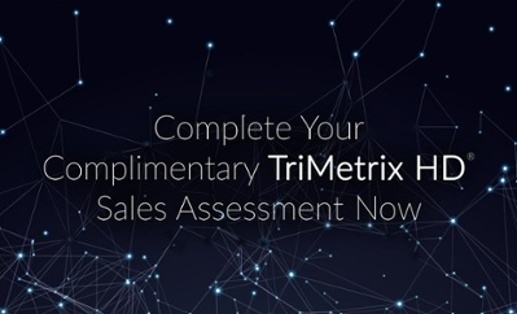The pattern of your thoughts shapes your future reality -- individually and collectively.
Mindset is one of those topics that is very “buzzworthy” among sales leaders. It has become such a trendy term that in a way, you could say its value has been somewhat cheapened.

But it is so damn powerful. Mindset among your sales staff deserves your attention.
First, let’s define mindset. According to Gary Klein, Ph.D.:
“A mindset is a belief that orients the way we handle situations – the way we sort out what is going on and what we should do. Mindsets aren’t just any beliefs. They are beliefs that orient our reactions and tendencies. They serve a number of cognitive functions. They let us frame situations: They direct our attention to the most important cues, so that we’re not overwhelmed with information. They suggest sensible goals so that we know what we should be trying to achieve. They prime us with reasonable courses of action so that we don’t have to puzzle out what to do. When our mindsets become habitual, they define who we are, and who we can become.”
In other words, mindset is critical to maximizing sales success.
Recognize when mindset issues are present.
The single most observable sign that a mindset is in the wrong place with existing salespeople is reduced sales performance or significant swings. Another sign is observed negative-focused self talk and language of low personal accountability. If either or both appear to be an issue, address this immediately. Do not let it go.
It is essential to understand the source of any mindset challenge. Is the mindset challenge due to one or a combination of the following?
The salesperson does not fit the job. Essentially, does the salesperson fit the mindset requirements to sell well in this particular sales role (Job Fit)?
Some sales roles are more “relationship-focused” and others are more “Prospect-focused”. Put a salesperson in a role he or she is unsuited for with strong accountability and mindset is going to be negatively-impacted. Ultimately, the better the Job Fit coupled with mindset habits, the better the sales performance.Top-performing salespeople possess the requisite Behaviors, Driving Forces, Acumen, and Competencies combination that helps shape their mindsets. This directly impacts the ability to perform in a given sales role.
Lack of proper mindset habits. Does the salesperson possess / use optimized mindset-shaping habits to protect and maximize their mojo? Have they adopted habits of shaping their own malleable mindset elements in the face of adversity so that they recover quickly? Are salespeople even aware that they have the power to shape their own mindset?
Some elements of mindset are hard-coded (Behaviors and Driving Forces) and unchangeable or less malleable while others may be improved upon when new habits of thought are adopted.
Some of these areas can be measured. Others not at all. It is absolutely essential to objectively-measure areas like Job fit including Behaviors, Driving Forces, Competencies, and Acumen using a sales personality / aptitude test with validity backed by brain research. Click here to complete our powerful complimentary sales assessment.
For Sales Managers, it is important to recognize that:
- Some mindset issues are deeply-ingrained and / or completely out of our control as managers.
- Some are none of our business. It is essential to control what we can control through sales selection, sales culture shaping and ongoing mindset-development opportunities.
Assuming only the best salespeople are selected, onboarded, coached and developed in the long run, then it is a matter of ensuring sales team members are aware of the power of their own mindsets and their own power to shape them. It is up to each person individually.This is best done through proper sales management, mentoring, and exposure to learning on Emotional Intelligence, the Law of Attraction, and books like The Fifth Agreement. Once Sales Wolves are aware of the cost of the problem and the benefits of adopting improved mindset-shaping habits, they will do so.
Unaddressed issues / concerns. Does your salesperson feels wronged or there are unresolved personal or professional challenges? Is there a personality clash between the salesperson and supervisor? Is there a disconnect from the vision? Does the salesperson feel valued?
Ultimately, when you truly have the best salespeople on the sales team coupled with a strong sales culture of fairness, accountability, and transparency, negative mindset issues are less likely to materialize. A clarification regarding of the use of "truly". You cannot possibly know if you truly have the best salespeople unless you objectively measure their "sales personality".

Prevent mindset issues in the first place.
You can take the above steps to remedy mindset issues, but prevention is the best medicine. There are four clear cut steps to prevent major mindset issues from consuming your sales team:
- Select and only hire Sales Wolves. Ensure that only the best salespeople who fit the Behaviors and Driving Forces essential to top sales performance are selected.
- Allow only Sales Wolf Managers to manage Sales Wolves. Be certain your Sales Wolf Managers have the requisite experience, plus awareness that they can powerfully-shape the mindsets of their sales team members.
- Maximize the sales culture by treating team members fairly, with accountability and transparency. Sales Wolves want to know the rules and they expect everyone to be held to the same standards.
- Help Sales Wolves understand that they can shape and rewrite their mental models of reality. Adoption of new habits of thinking can positively alter those malleable elements of mindset.
Engage negative mindset issues immediately. Talk about it. Learn from it. Do not treat negative mindset as something bad. Instead treat negative mindset as something to study, learn from and improve upon.




